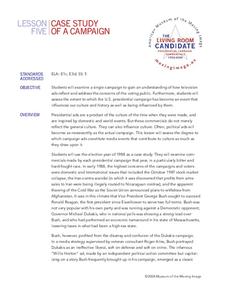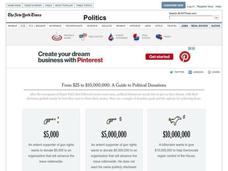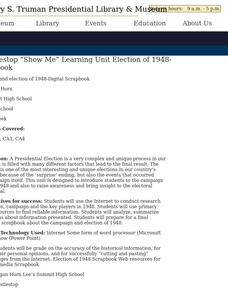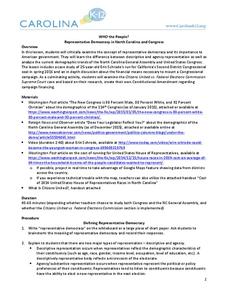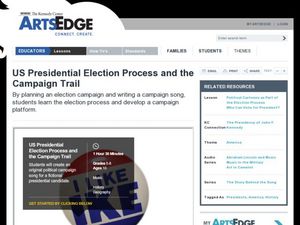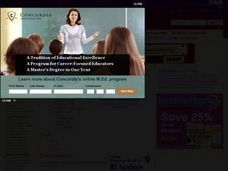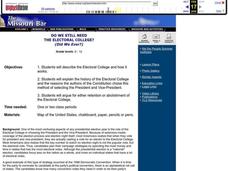Curated OER
Case Study of a Campaign
Students read a case study of one campaign to discover how political campaigns addresses the needs of the voters. In groups, they answer questions related to the case and discuss how the commercials affect society as a whole. They use...
The New York Times
A Guide to Political Donations
Voters determine the outcome of elections, but campaign donors can influence the attitudes of those voters. Explore nine examples of donors and the amounts of money they want to contribute, and the legal ways the groups can or cannot...
Classroom Law Project
What is a class hearing and youth summit and what do they have to do with the presidential election?
After researching the presidential election process, class members develop questions and interview voters about their choice of candidate and the issues that concern them.
Curated OER
Money and the Election Process: Ch 7
Where does the money for political campaigns come from? Guide your class with 10 multiple choice questions on money and the election process. There are 5 true/false and 5 multiple choice questions for them to answer. Use as a quiz or for...
Curated OER
Cartoons for the Classroom: Campaign Echoes
Get on those thinking caps, because your class is going to analyze a political cartoon related to the 2008 presidential elections. Included is a large image of the cartoon, background information, and three guiding questions which can be...
Brown University
Following the U.S. Presidential Election
Election years provide the opportunity to evaluate news media as well as the next prospective president. High schoolers read about the same event in several different news sources, varying in type, origin, and political leaning, before...
Curated OER
The Presidential Campaign Game
Upper graders play a game as a way to facilitate understanding of US Presidential Campaign issues and strategies. After being divided into small groups, a candidate will be chosen to run for office. Each group creates propaganda to get...
Encyclopedia Britannica
Becoming US President
It's that time of year, and the year. Once again the race is on for the White House. It's important that young voters, and would-be voters, understand the process for becoming the United States President. Class members research the...
John F. Kennedy Presidential Library & Museum
Red States/Blue States: Mapping the Presidential Election
Young historians investigate how voting patterns have changed by comparing the outcome of the 1960 election to the outcome of the recent election. A creative final assessment has participants making a news show wherein they provide...
Curated OER
Election of 1948-Digital Scrapbook
Students create a digital scrapbook of the election of 1948 -- one of the most interesting and unique elections in US History.
Curated OER
Election 2005: Campaign Issues
Learners take a closer look at the election of 2005. In this British politics instructional activity, students listen to a lecture about the 2005 campaign and active citizenship. Learners then create collages and news boards about the...
Carolina K-12
Get Out the Vote!
What better way to have a class learn about get out the vote campaigns than by having them create one themselves? After introducing get out the vote efforts and why they exist through videos, articles, and discussion questions, the...
Encyclopedia Britannica
Candidate Position Research
As part of their study of the US Presidential election process, class members research a presidential candidate's position on a specific topic or topics. Formatting their research as a pro/con question ("Should the Death Penalty Be...
Encyclopedia Britannica
Beyond a Two-Party System
Young political scientists go beyond the two-party system and research third-party candidates running in the 2020 US Presidential election. Groups present background information about the candidate, the party's platform points, and a...
Curated OER
Youth Voter Campaign
Young scholars examine the voting data for the state they where they live. In this voting lesson, students research possible ways to increase the number of people that vote then create a campaign to share an idea of their own with the...
Curated OER
Voting And Elections
Students examine the voting practices of the past several presidential elections while using data to determine the influence of different factors. They identify the reasons for high or low voter turnout and then display the outcome of...
Curated OER
Election Vocabulary Brainstorm
Students participate in numerous activities pertaining to elections. They study election vocabulary and generate questions about campaigns and elections. They paraphrase articles and generate a class vocabulary list.
Carolina K-12
Who the People? Representative Democracy in North Carolina and Congress
Our elected officials are supposed to represent us, but what does it mean when they aren't like us? Budding citizens explore the demographic makeup of the US Congress, the role of money in political elections, and the Citizens United...
Classroom Law Project
Who are the major candidates and where do they stand?
Who were the candidates in the 2008 US Presidential election and where did they stand on important issues? Use a resource that offers an opportunity to go back in time and examine candidates and issues involved in that election year.
PBS
What Are the Primaries and Caucuses?
What are the essential differences between primaries and caucuses? As part of a study of the process by which Americans select their candidates for US president, class members examine the nominating process, the changes that have...
Curated OER
US Presidential Election Process and the Campaign Trail
Students campaign for president. In this presidential election lesson, students discuss the process of electing presidents, write their own campaign songs, research a campaign train schedule, and create campaign maps.
Curated OER
Getting to Know the Candidates: Analyzing Their Campaign Ads
Pupils examine the role of advertising in presidential campaigns. They analyze one candidate's advertising campaign ads for elements such as major issues, positivity, negativity, facts, and opinions.
Curated OER
US Presidents
Students work in small groups to analyze various presidential campaigns. In this presidential election lesson, students research election rules, candidates, and winners from 1900 to 2000. Students will create and present an oral report...
Curated OER
Do We Still Need the Electoral College?
One of the most confusing aspects of any presidential election year is the role of the Electoral College. Learners read a bit about how the Electoral College works and then they hold a mock election in their classroom. They'll redraw a...


